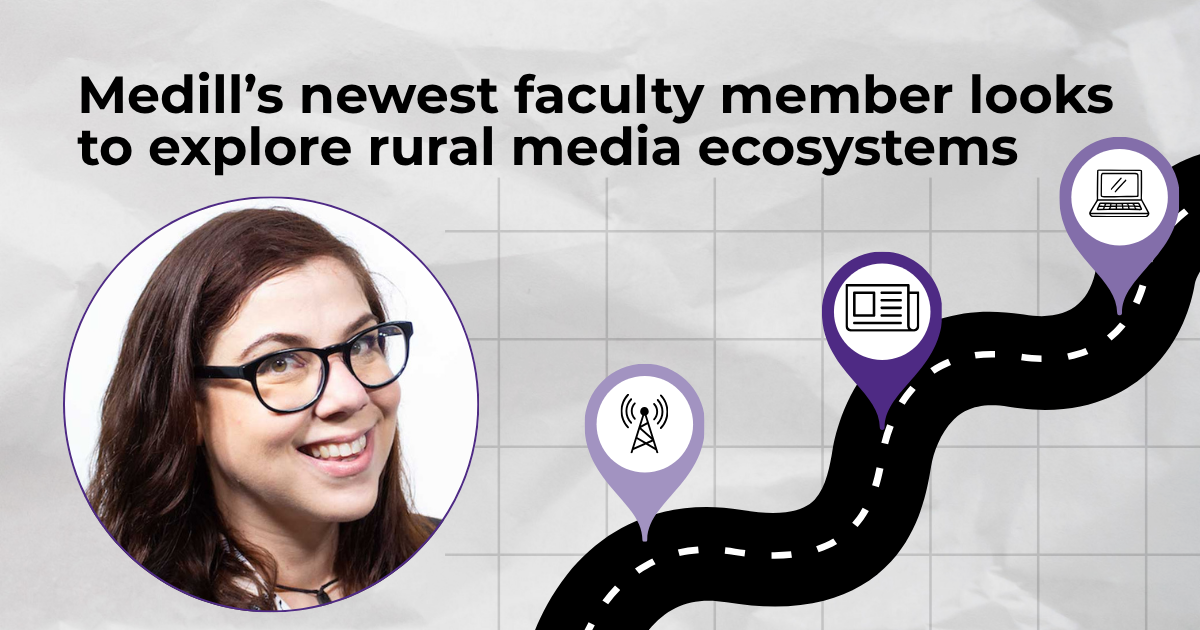For Medill’s faculty member, assistant professor AF Battocchio, research is more than just crunching numbers.
“It has forced me to sort of step out of myself, to challenge my own assumptions and to be more open to trying to understand these stories, even if they may deviate from the stories that we see being commonly told,” they said.
Battocchio joined Medill’s faculty in the fall. Their research focuses on rural media environments in rural and post-industrial communities, specifically in Michigan’s Upper Peninsula. By combining spatial mapping and computational analysis with ethnographic field work, they look to explore how these communities obtain and navigate information in today’s changing news landscape.
Battocchio has found that these avenues range significantly.
“Sometimes that looks like traditional newspaper, sometimes that looks like a combination of newspaper and radio,” they said. “Sometimes it looks like a combination of critical actors who share information because they have a role in a nonprofit or some other non-news entity, and they help fill in some of those gaps.”
Battocchio is originally from a small town near Duluth, Minn. They were the first dual-degree graduate from Loyola University Chicago’s School of Communication, receiving a B.A. in Advertising (2019) and an M.S. in Strategic Communication (2020). They earned their Ph.D. from Michigan State University in Information and Media in Spring 2025.
As a non-traditional undergraduate student, Battocchio pulls from their personal experiences working for grassroots, community-based media organizations before attending college.
“These are all things that I think helped me understand the populations that I work with, especially in rural areas,” they said.
They hope to bring these perspectives into the Medill community to support students.
“I think it’s important to normalize the different journeys that people take,” Battocchio said. “I am really passionate about making sure that students are supported, especially if they have socioeconomic barriers to education.”
While completing their research, Battocchio found alternative news sources fill gaps in news deserts. For example, a host at a classic rock radio station in the Upper Peninsula dedicates two hours each weekday to local government programming. He invites council members and city officials to join the broadcast, and community members call in with their questions. For many in this region, it provides a chance to hear directly from community leaders and ask questions.
“These are really powerful tools, but they’re not tools that are necessarily being categorized,” they said.
For Battocchio, Medill provides a unique opportunity to explore news desert ecosystems.
“Being at Medill [with] the Local News Initiative and the Local News Accelerator opens up the opportunity for doing more collaborative partnerships and perhaps more solutions journalism-oriented initiatives that bring research and practice together,” Battocchio said.
Battocchio also encourages audiences to redefine perceptions of rurality, saying that “we tend to think about rurality as a very monolithic concept.”
“We’ve seen over the past 10 years a lot of focus on rural areas, like the revenge of the white rural voter and JD Vance’s Hillbilly Elegy, and all of those things. But I don’t always see as much of a digging into the rural experience and trying to understand rurality not from a deficit perspective,” they said.
Through their work, Battocchio aims to bridge gaps and invite the communities they cover into the conversation.
“If we’re going into a community, we’re writing about them in super academic language, and the majority of the community doesn’t have a post-secondary education,” they said. “We’re telling stories about them, without them, that are not always accessible.”
Creating this change through research starts with spending time in the community, which Battocchio does for their research. Medill allows them to be within driving distance of the areas they focus on while being supported by a welcoming community.
“I really love how Medill is a place where you have practitioners and you have researchers, and everyone gets to sort of bring who they are, the talents they have, the personalities they have,” they said.
